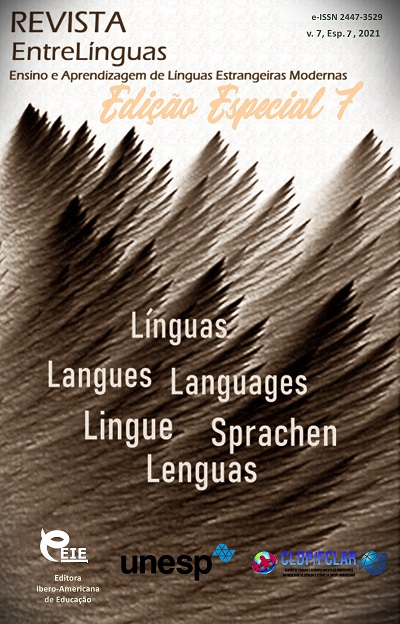O sistema de linguagem e seu funcionamento na fala
DOI:
https://doi.org/10.29051/el.v7iesp.7.16310Palavras-chave:
Linguagem e fala, Significado, Ambigüidade, Linguística cognitivaResumo
Na era dominante, o problema de estudar a semântica de uma unidade lexical enfrenta a totalidade do complexo “pensamento - sistema de linguagem - fala”, envolvendo a equipe multissegmentada de cientistas. Portanto, o presente artigo tenta fornecer provas suficientes para a natureza não reflexiva da linguagem e da fala. A observação linguística, o método descritivo, a comparação como método linguístico universal são utilizados para atender ao objetivo do estudo. Foi demonstrado que uma forma linguística, que, via de regra, é descrita pelo dicionário como tendo muitos significados metafóricos figurativos, é interpretada como inequívoca no sistema de linguagem. Novos significados emergem, são arranjados pelo falante e pelo ouvinte no processo de comunicação, no quadro de um enunciado. Portanto, a polissemia pode ser vista não como um fenômeno de palavra no sistema de linguagem, mas como um fenômeno de um enunciado na fala.
Downloads
Referências
Arkhipov I. К. Communicative Zeitnot and Prototypical Semantics // Herald of Herzen Uni-versity № 4 (7). – SP.: RSPU, 2004. (in Russian)
Boikova I. B. The Sign Structure and Language Functionality // Proceedings of the 3rd Inter-national Workshop on Cognitive Linguistics. Part 2. – Tambov, 2002. [in Russian]
Buslaev F. I. Historical Grammar of the Russian Language. – М.: Science, 1959. [in Russian]
Gardiner A. Difference Between “Speech” and “Language” // V. А. Zvegintsev. The History of Linguistics of 20th-19th Centuries in Essays and Abstracts. P. 2. М.: Progress, 1965. [in Russian]
Grechko V. А. The Theory of Linguistics: Manual. – М.: Higher School, 2003. [in Russian]
Guillaume G. The Principles of Theoretical Linguistics. М.: Progress, 1992. [in Russian]
Humboldt W. Selecta on Linguistics. М: Progress, 2001. [in Russian]
Karamalak O., Pesina S. Linguistic sign and reading as text creating activity // Linguae Slov-enska Vzdelavacia a Obstaravacia s.r.o. Vol. 1 (2017), P. 2-14. DOI: 10.18355/XL.2017.10.01.01 ISSN: 1337-8384
Lomtev Т. P. General and Russian Linguistics. – М: Наука, 1976. [in Russian]
Lyons J. Introduction into Theoretical Linguistics – М.: Progress, 1978. [in Russian]
Lyons J. Language and Linguistics. Introductory Survey. – М: Editorial URSS, 2004. [in Russian]
Mednikova E. М. The Meaning of a Word and Methods of its Study. – М., 1974. [in Russian]
Paul H. Principles of the History of Language. – М.: Progress, 1960. [in Russian]
Pavlov V. М. Language Capacity of an Individual as an Object of Linguistic Science // The Theory of Speech Activity. – М., 1968. [in Russian]
Pesina S., Latushkina O. Polysemy and Cognition // Procedia - Social and Behavioral Scienc-es, Vol. 192, 24 (2015), P. 486 – 490.
Pesina S., Pulekha I., Tandon P., Functional Peculiar properties of Lexical Markers in the English Language, Gumanitarno-pedagogicheskie issledovaniya [Humanitarian and pedagogical Research], vol. 3, no 1, P.76 81. (2019) [in Russian]
Pesina S., Solonchak T. Word Functioning in Communication Process // Procedia - Social and Behavioral Sciences, Vol. 192, 24 (2015), P. 346 – 351.
Pesina S., Yusupova L. Words Functioning in Lexicon // Procedia - Social and Behavioral Sciences, Vol. 192, 24 (2015), P. 38 – 43.
Pesina S.A., Churilina L.N., Skvortsova M.L., Kozhushkova N.V., Baklykova T.Yu., Teren-tieva N.G. Functioning of polysemantic words in the lexicon // Applied Linguistics Research Journal. 2020. V. 4. № 9. P. 64-69. DOI: 10.14744/alrj.2020.24855
Pesina, S.A. Multi-level structure of polysemous word: Invariant-cluster analysis // Voprosy Kognitivnoy Lingvistikithis, 2021(1), PP. 60–69. DOI: 10.20916/1812-3228-2021-1-60-69, 2й квартиль, Импакт 0,922
Potebnya А. А. Notes from Russian Grammar. Vol. 1-2. М.: Science, 1959. [in Russian]
Saussure Ferdinand de. Course in General Linguistics. М.: Logos, 1998. [in Russian]
Solonchak T., Pesina S. Language Ability and Word Functioning // Procedia - Social and Be-havioral Sciences, Vol. 192, 24 (2015), P. 447 – 452.
Zvegintsev V. А. Language and Linguistic Theory. – М.: Editorial URSS, 2001. [in Russian]
Downloads
Publicado
Como Citar
Edição
Seção
Licença

Este trabalho está licenciado sob uma licença Creative Commons Attribution-NonCommercial-ShareAlike 4.0 International License.
Os manuscritos aceitos e publicados são de propriedade da Revista EntreLínguas. Os artigos publicados e as referências citadas na Revista EntreLínguas são de inteira responsabilidade de seus autores.
Transferência de direitos autorais – autorização para publicação
Caso o artigo submetido seja aprovado para publicação, já fica acordado que o(s) autor(es) autoriza(m) a UNESP a reproduzi-lo e publicá-lo na EntreLínguas, entendendo-se os termos “reprodução” e “publicação” conforme definição respectivamente dos incisos VI e I do artigo 5° da Lei 9610/98. O artigo poderá ser acessado pela rede mundial de computadores (Internet), sendo permitidas, a título gratuito, a consulta e a reprodução de exemplar do artigo para uso próprio de quem a consulta, desde que haja a citação ao texto consultado. Essa autorização de publicação 328 EntreLínguas, Araraquara, v. 1, n .2, p. 323-328, jul./dez. 2015 não tem limitação de tempo, ficando a UNESP responsável pela manutenção da identificação do(s) autor(es) do artigo. Os artigos publicados e as referências citadas na Revista EntreLínguas são de inteira responsabilidade de seus autores.











